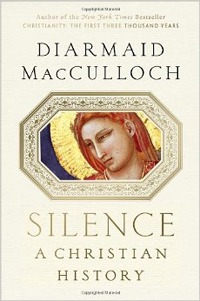Book Notes
 Diarmaid MacCulloch, Silence, A Christian History (New York: Viking, 2013), 338pp.
Diarmaid MacCulloch, Silence, A Christian History (New York: Viking, 2013), 338pp.
Any new book by the Oxford historian Diarmaid MacCulloch is an automatic read for me. I've previously reviewed his two award-winning books, The Reformation (2003) and Christianity: The First Three Thousand Years (2010), and the film version of the latter title produced by the BBC in six DVDs (which I watched three times).
His new book is a bit different, as it combines critical history with a personal agenda. The Yale historian Jaroslav Pelikan once commented on this awkward situation. The historian must analyze the data with rigorous neutrality, and yet do so with an awareness of your own biases. He compared it to doing brain surgery on your mother. Pelikan was a self-identified believer, so he faced one set of challenges; MacCulloch is not, and so his book reads like an axe to grind.
There's material aplenty in the Bible and Christian history to warrant this fascinating study. There's the silence of God in the psalms, the silence of Jesus before his accusers, Paul's silencing of women at Corinth, and the famous half-hour of silence in Revelation. Recall the monastic silence of Carthusians, Cluniacs, and Cistercians. The rule of Benedict devotes an entire chapter to silence. There's the silence of Orthodox hesychasts and Protestant Quakers. Or consider the "vanished voices" of history — "one scholarly calculation is that 85 percent of the texts we positively know to have once existed in the first 150 years of Christianity's life are now lost, to say nothing of texts from that period of whose existence we have never heard."
"Every silence is different and distinctive," observes MacCulloch. Not all silence is golden. There are silences of shame, evasion, and willful avoidance, and silences of dissimulation and forgetfulness enforced by powerful authorities. Recall the Inquisitions. In the introduction and in his conclusion MacCulloch is unapologetic about his personal bias. He calls his negative observations about silence, especially those about homosexuality (he is gay), pedophilia, anti-Semitism, and slavery, "a necessary penitential work of stripping the altars" (234). You might argue that the role of a whistle blower is better left for memoir than history. And I hope that one day MacCulloch will publish a memoir. I will read it with relish.


